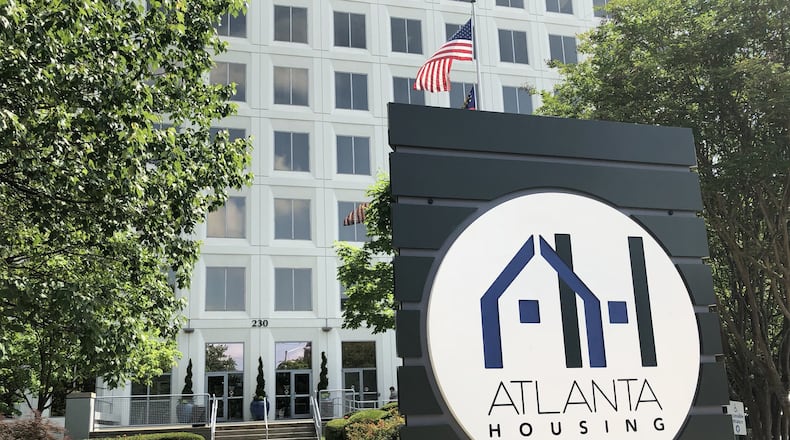Atlanta’s housing authority put a proposed settlement with a developer on ice Friday, extending a long, costly dispute over more than 75 acres of public land.
In a contentious public hearing, the authority's board declined unanimously to vote on a controversial deal with Integral Group that would have surrendered the agency's control of the land to the developer for millions of dollars less than it is allegedly worth.
That means the legal dispute likely is headed back to court after years of lawsuits and countersuits. Integral has sued the housing authority for breach of contract and damages and has asked a judge to order the board to accept a previous accord. That lawsuit had been put on hold awaiting Friday’s planned vote.
The proposed settlement would have given Integral control of the land for nearly $22 million. The authority also would have been on the hook for up to $1.8 million in legal fees incurred by the developer.
At a time when intown property is increasingly in demand and real estate prices have surged, the authority has placed the land’s value at about $90 million.
The land was once home to a number of public housing projects, including Capitol, Carver, Grady and Harris homes. Those projects were demolished as the city’s housing authority overhauled how it subsidized homes for low-income residents in the 1990s and 2000s.
When fully occupied, those projects were home to a greater proportion of city residents than any other system in the nation. Integral was involved in tearing the buildings down.
Friction in the ongoing dispute goes beyond price: How much affordable housing should be built on the contested land and who should control it?
The properties in question already have 2,500 units, including 1,840 that are priced as affordable to residents with no more than 60% of the area’s median income, according to developers.
Under the proposed settlement terms, Integral and its partners would have permitted the housing authority to subsidize about one-fifth of the apartments and houses that the developer would build on the properties, making them more affordable for people with modest income.
However, the settlement was criticized by some affordable housing advocates who said many of those subsidized units would still be too expensive for the lower-income residents that are typically served by the authority.
Integral's dispute with the authority started when Kasim Reed was Atlanta's mayor. In a recent statement, Integral's attorney Wayne Kendall called Reed's objections "obstructive" and argued that the settlement is in the best interests of city residents.
Reed has continued to criticize the proposed settlement. The former mayor attended Friday’s meeting, but he did not speak and left as soon as the board declined to vote. Most of the housing authority’s current directors were appointed by Reed when he was mayor.
During the public comments following the board’s decision not to vote on the settlement, Julian Bene, a former board member of Invest Atlanta, said the housing authority might be getting less than fair market value. But he said it will end up costing more to keep fighting.
“If you are legally liable, you shouldn’t be dragging this out,” Bene said. “If as you say, you are stuck with it, then you’re stuck with it. I would say, it’s time to look to the future.”
A number of affordable housing activists attacked the board’s motives, arguing that it was ignoring the growing population of homeless. “I hope that the board will not re-litigate eight years of dysfunction,” said Carrie Salvary.
Board chair Christopher Edwards publicly defended the board’s integrity.
“I just want to get to the point where we are helping the people in need,” he said.
“I am not going to be leaned on by the right. And I am not going to be leaned on by the left,” Edwards added.
In an interview later with The Atlanta Journal-Constitution, board member Kirk Rich said he just could not agree to surrender so much property.
“That was the deal killer for me,” Rich said. “And we had nothing in black and white from them that they would protect those affordable units.”
Board members now hope to meet with Integral Chief Executive Egbert Perry and hash out what's good for the city, he said.
Representatives of the developers indicated to the AJC after Friday’s meeting that a return to court is much more likely than a return to the negotiating table.
Integral said it has long held options to the land because of agreements in which the authority agreed to split the risk of developing the sites. But when Perry tried to exercise the 2011 options during Reed’s second term, officials at Atlanta Housing objected.
Officials at the time said they feared the deal would mean walking away from the agency’s efforts to prevent the post-recession rise of property values from totally excluding low-income residents.
Even if Atlanta Housing gives over control of the disputed properties to Integral, it does control other properties, and a settlement could free the agency up to work on developing those parcels. But the settlement's expense might constrain current Mayor Keisha Lance Bottoms, who campaigned on the promise of investing $1 billion in affordable housing.
About the Author
Keep Reading
The Latest
Featured



